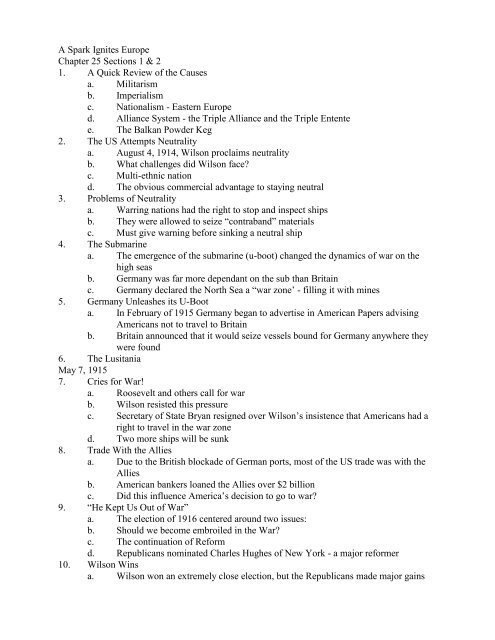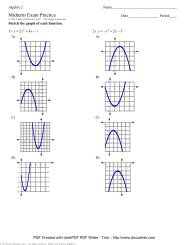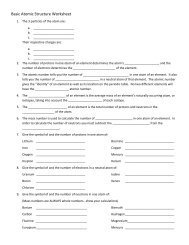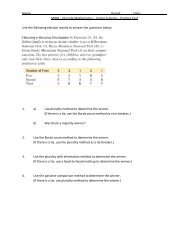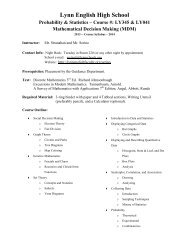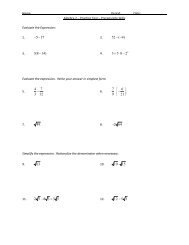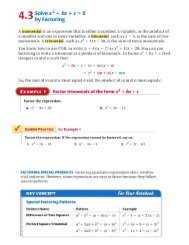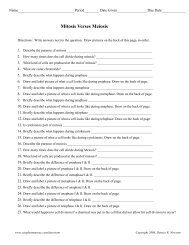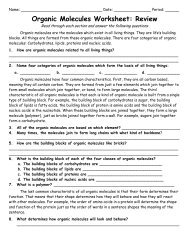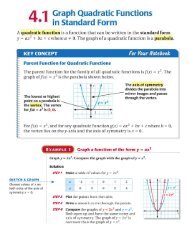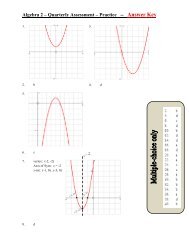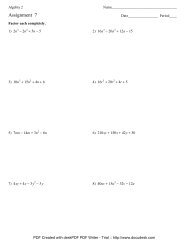Chapter 25 World War 1 - Lynn English Faculty Websites
Chapter 25 World War 1 - Lynn English Faculty Websites
Chapter 25 World War 1 - Lynn English Faculty Websites
- No tags were found...
Create successful ePaper yourself
Turn your PDF publications into a flip-book with our unique Google optimized e-Paper software.
A Spark Ignites Europe<strong>Chapter</strong> <strong>25</strong> Sections 1 & 21. A Quick Review of the Causesa. Militarismb. Imperialismc. Nationalism - Eastern Europed. Alliance System - the Triple Alliance and the Triple Ententee. The Balkan Powder Keg2. The US Attempts Neutralitya. August 4, 1914, Wilson proclaims neutralityb. What challenges did Wilson face?c. Multi-ethnic nationd. The obvious commercial advantage to staying neutral3. Problems of Neutralitya. <strong>War</strong>ring nations had the right to stop and inspect shipsb. They were allowed to seize “contraband” materialsc. Must give warning before sinking a neutral ship4. The Submarinea. The emergence of the submarine (u-boot) changed the dynamics of war on thehigh seasb. Germany was far more dependant on the sub than Britainc. Germany declared the North Sea a “war zone’ - filling it with mines5. Germany Unleashes its U-Boota. In February of 1915 Germany began to advertise in American Papers advisingAmericans not to travel to Britainb. Britain announced that it would seize vessels bound for Germany anywhere theywere found6. The LusitaniaMay 7, 19157. Cries for <strong>War</strong>!a. Roosevelt and others call for warb. Wilson resisted this pressurec. Secretary of State Bryan resigned over Wilson’s insistence that Americans had aright to travel in the war zoned. Two more ships will be sunk8. Trade With the Alliesa. Due to the British blockade of German ports, most of the US trade was with theAlliesb. American bankers loaned the Allies over $2 billionc. Did this influence America’s decision to go to war?9. “He Kept Us Out of <strong>War</strong>”a. The election of 1916 centered around two issues:b. Should we become embroiled in the <strong>War</strong>?c. The continuation of Reformd. Republicans nominated Charles Hughes of New York - a major reformer10. Wilson Winsa. Wilson won an extremely close election, but the Republicans made major gains
. In January, 1917, Wilson calls for “peace without victory”c. 9 days later, Germany resumes unrestricted Submarine <strong>War</strong>fare11. The Zimmermann Notea. The catalyst for the American entry into the war was the Zimmermann Noteb. Germany offered a deal to Mexico in exchange for an alliance against the USc. Wilson authorized the arming of merchant marine ships12. The US Goes to <strong>War</strong>a. A revolution in Russia gave a sense of urgency to those who supported warb. April 12, 1917, Wilson asked Congress for a Declaration of <strong>War</strong>c. “The <strong>World</strong> must be made safe for democracy”13. Wilson’s Dreama. In January, 1918, Wilson went before congress with his vision for the post-warworldb. “14 Points”c. No more “secret diplomacy”d. Self-determinatione. Establishment of the League of NationsThe Home Front<strong>Chapter</strong> <strong>25</strong> - Section 314. Mobilizationa. Congress passed the Selective Service Actb. Men between 21 and 31 registeredc. 687,000 in first draft lotteryd. Shortages of equipment and weaponse. Artillery and tanks provided by Britain and France15. The <strong>War</strong> at Seaa. A “bridge of ships’ transferred US troops to Europeb. Fortunately the US Navy was in better shape than the Armyc. Convoys were implemented to protect troop carriers from subsd. To help pay for war, the US introduced “Liberty Bonds”16. An Expanded Role for Governmenta. In December 1917, the government took over most railroadsb. Sec. Of the Treasury William McAdoo ran themc. The “Council of Defense” mobilized industry and agricultured. Headed by Herbert Hoover17. Food Administrationa. Voluntary “wheatless, meatless, heatless” days were encouragedb. “war gardens”c. Grain-based alcohol was bannedd. High prices for food were established to encourage farmers to increase production18. <strong>War</strong> Industries Boarda. The ineffectiveness of the Council of National Defense forced Wilson to askedCongress for more powerb. Overman Act of May 1918 created the “<strong>War</strong> Industries Board” under BernardBaruch -a Wall Street financierc. He became the “economic dictator”19. The Labor Force
a. With 4 million enlisted in the Service, Women moved into many of the previouslymale-dominated jobsb. This change would not be permanentc. African-Americans moved North in great numbersd. AF of L promised not to strike20. Mobilizing Mindsa. There were a great many Americans opposed to the <strong>War</strong>b. Socialists, German-Americans, Irish-Americans, Progressivesc. Wilson created the Committee of Public Information led by George Creeld. Official Bulletin21. The Attack on Civil Libertiesa. The Espionage Act (1917) gave the President powers of Censorshipb. The Trading with the Enemy Act (1917) forced newspapers printed in a foreignlanguage to provide the government with a translationc. The Sedition Act (1918) curbed freedom of speech22. Schenck v United States - 1919a. Charles Schenck, a Socialist, circulated a flyer to drafted men. The flyer, whichcited the Thirteenth Amendment's provision against "involuntary servitude," toldthe men to "assert opposition to the draft," which it described as a moral wrongdriven by the capitalist system. The circulars proposed peaceful resistance, such aspetitioning to repeal the Conscription Act.23. Schenck v United States - ba. the Court held, that the circumstances of wartime permit greater restrictions onfree speech than would be allowable during peacetime.b. Holmes's view that "The most stringent protection of free speech would notprotect a man in falsely shouting fire in a theater and causing a panic."24. The Armisticea. On November 11, 1918, at 11:00 AM, the war came to an endb. A cease-fire (ARMISTICE) was signedc. Over 9 million dead made <strong>World</strong> <strong>War</strong> 1 one the deadliest in history<strong>25</strong>. Impact of the <strong>War</strong>a. Wilson goes to Paris to negociate a peace treatyb. The Versailles Treaty does the following:c. Punish Germanyd. Redraws the map of Europee. Starts the League of Nationsf. The US DOES NOT join the League!!!26. Impact at Homea. Two Constitutional Amendmentsb. 18th Amendment started “prohibition” - no booze!c. 19th Amendment - Women won the right to voted. African Americans move North in big numbers


